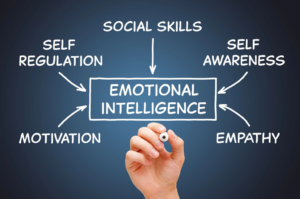 by Steven Carrizal
by Steven Carrizal
 Emotional intelligence is commonly described as the awareness and management of emotions and emotional reactivity within ourselves and what we are experiencing from others.[1] Good leaders learn how to do this, first by acknowledging their own emotions and understanding what it feels like when they are stirred up by various difficult situations. As we grow in these skills, we are able to more clearly see what might be happening in others in those same difficult situations. Mature leaders are then able to manage our own emotional reactivity as well as help others manage their emotional reactivity.
Emotional intelligence is commonly described as the awareness and management of emotions and emotional reactivity within ourselves and what we are experiencing from others.[1] Good leaders learn how to do this, first by acknowledging their own emotions and understanding what it feels like when they are stirred up by various difficult situations. As we grow in these skills, we are able to more clearly see what might be happening in others in those same difficult situations. Mature leaders are then able to manage our own emotional reactivity as well as help others manage their emotional reactivity.
Emotional Intelligence creates the opportunity for empathy.
What might this look like in practice? Let me illustrate with two stories. I’ll start with a personal story.
Sometime early in my second job, about six or so years into my time in ministry, I came to the elders to present an idea for my youth ministry. It was an idea that I not only thought was a great idea, I was certain everyone else would agree.
I was wrong.
They rejected the idea. At least that’s what it felt like to me. After my presentation came the questions, which at the time felt like an interrogation. Rather than the merits of the idea being discussed, I felt as though my value as a minister was being questioned and I got defensive. Only, I didn’t know I was getting defensive, I was simply responding in the only way I knew how.
Shortly after, I had my yearly evaluation, an exercise rather new to me. One of the items the elders had on the “needs to improve” list was to address my defensiveness. I had no idea what they were talking about. It’s highly likely that I either got defensive or shut down (my other go-to reactive behavior).
Thankfully, I was surrounded by leaders who cared about my development as an individual and especially as a leader. They were patient and invested in my journey of discovery. Through helpful conversations and personality assessments, I grew in my understanding of my emotional presence and reactivity.
What I would later come to realize was that in those formative moments, I was the object of mature leaders who demonstrated emotional intelligence and empathy. Though we didn’t use those terms then as we understand them now, in their patience, my elders demonstrated empathy, which directly flows out of emotional intelligence.
The second story comes from Scripture. In John 8 we find a great example of Jesus demonstrating emotional intelligence and empathy. Here’s the story in brief.
Some religious leaders have brought a woman to Jesus claiming she was caught in the act of adultery. It is a devious plan that involves a double trap. They set up the woman in order to set up Jesus. Even more, they are claiming the right, as spelled out in the law of Moses, to stone the woman for her sin. It is an emotion-filled situation with reactivity spilling out on two fronts.
Rather than getting caught up in only one side Jesus brings empathy to bear on both fronts. First, he steps into the emotional world of the religious leaders acknowledging their right to carry out the justice they desire. Yet, he deescalates the amped up accusers with a surprising stipulation: the first stone must be thrown only by someone without sin. Next, after the chaotic scene clears out, he steps into the emotional world of the woman accused to lift her out of her shame made public and restore her dignity.
Preceding each move, Jesus takes a quiet moment in which he stoops down and writes in the ground. While there has been much speculation about what Jesus does in these two interludes, perhaps the best explanation is that he was simply pausing to process his own emotions and managing the reactivity stirred up by the preposterousness of the situation. This gives space for two other important things to happen. One is that the attention he draws quiets the crowd and begins to dissipate the energy. The second is that, as he tends to do, Jesus has the time to come up with a creative response.
Jesus demonstrates the clear markers of emotional intelligence and empathy. Rather than standing in opposition of the religious leaders in their hypocrisy and deception and the woman in her sin, he comes alongside them. His awareness of the emotions of the moment, his own as well as everyone else’s, allows him to see the situation clearly and act effectively.
In both stories we can see emotional intelligence and empathy at work in the actions of mature leaders. And in my story, we can see how a lack of emotional intelligence can really hold someone back, especially if no mature leaders were in place who can see the opportunity to coach a slow-to-get-it young minister into maturity.
Growing in emotional intelligence, and subsequently empathy, can be a slow and sometimes painful process. Owning up to past instances of poor leadership moments is difficult. However, honest leaders and useful resources can be helpful guides in a journey that pays huge dividends among the church family you are leading and with the next generation of leaders in your charge.
[1] The following articles were helpful in this description of emotional intelligence and provide more information about emotional intelligence in leadership: “Spotlight: What it means to be emotionally intelligent,” It’s Your Yale, (n.d.), https://your.yale.edu/spotlight-what-it-means-be-emotionally-intelligent; Lauren Landry, “Why Emotional Intelligence Is Important in Leadership,” Harvard Business School Online, April 3, 2019, https://online.hbs.edu/blog/post/emotional-intelligence-in-leadership.
[2] The following articles were helpful in this description of empathy and provide more information about empathy in leadership: Michelle Bonterre, “Empathetic Leadership: How to Go Beyond Lip Service,” Harvard Business Publishing Corporate Learning, November 30, 2023, https://www.harvardbusiness.org/empathetic-leadership-how-to-go-beyond-lip-service/; “The Importance of Empathy in the Workplace,” Center for Creative Leadership, April 28, 2024, https://www.ccl.org/articles/leading-effectively-articles/empathy-in-the-workplace-a-tool-for-effective-leadership/; Tracy Brower, PhD, “Empathy Is The Most Important Leadership Skill According To Research.” Forbes, September 19, 2021, https://www.forbes.com/sites/tracybrower/2021/09/19/empathy-is-the-most-important-leadership-skill-according-to-research/.

Leave a Reply